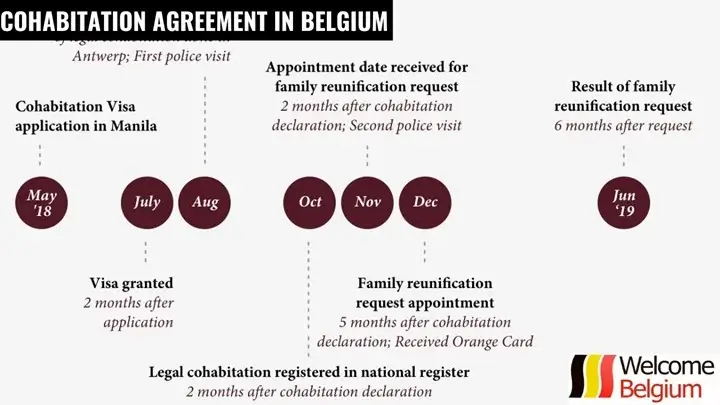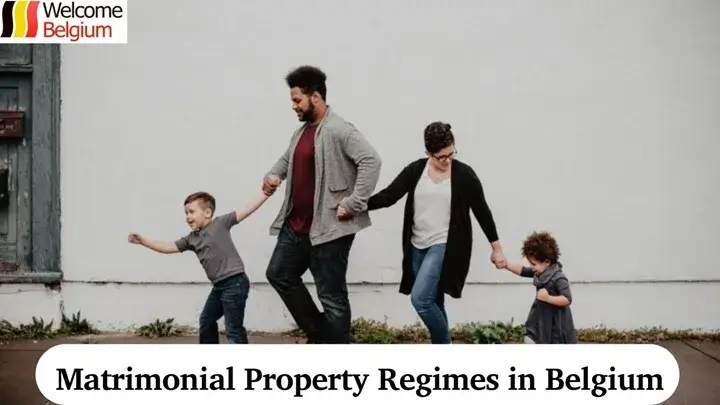Cohabitation Agreement in Belgium (Contrat de cohabitation) provides a couple with unique legal opportunities to regulate their relationship within a civil union. This is an important legal document that can be useful not only for local residents, but also for foreign citizens who want to secure their rights in Belgium. In this article, we will consider how to correctly formalize a cohabitation agreement, what rights and obligations it entails, as well as its impact on the social and legal aspects of life in the country.
What is a cohabitation agreement in Belgium
A cohabitation agreement in Belgium is a legal document that regulates the relationship between people living together but not married. It provides legal recognition of the relationship, including for foreign citizens, and provides legal protection. The agreement is important for couples who want to ensure their legal status and rights in Belgium, without having to enter into an official marriage. It also helps regulate issues of property rights, social security and tax benefits.
Functions of a cohabitation agreement in Belgium:
- Legal recognition of the relationship:
A cohabitation agreement allows partners to officially recognize their relationship in the eyes of the law. This is especially important for foreign citizens, as it provides cohabitation status and legal rights, such as the ability to apply for health insurance, social benefits, etc. - Establishing the rights and obligations between partners:
The document clearly defines the responsibilities of each partner. This includes aspects such as financial support, joint management of the household, obligations for each other’s safety and well-being. This helps to avoid disagreements in the future and formalizes obligations. - Impact on inheritance and property rights:
The agreement may regulate inheritance issues and rights to property acquired during the period of cohabitation. This is important to ensure the partners’ rights to property in the event of the death of one of them or the breakdown of the relationship. - Entitlement to healthcare and social benefits:
The agreement provides access to healthcare and social benefits on an equal basis with spouses. This may include the right to family health insurance, access to a pension or assistance in the event of a partner’s disability, which is important for foreigners, especially those who cannot register their marriage for some reason. - Possibility of improving the couple’s tax position:
Forming an agreement may provide additional tax advantages. For example, there may be tax breaks on joint property, a reduction in taxes on the income of one of the partners who is not working, or relief in paying utility bills. - Defining Property Rights and Obligations in the Event of a Breakup:
An agreement helps prevent property disputes in the event of a separation. It specifies how property will be divided if the relationship ends and what obligations each partner will have, including alimony or other obligations. - Protection of rights in case of death of one of the partners:
If one of the partners dies, the agreement helps to guarantee the rights of the surviving partner to the property and inheritance. Without such a document, the partner can be deprived of rights to the property if there is no official document confirming their relationship. - Recognition of rights for foreign nationals and immigrants who cannot enter into a legal marriage:
The agreement allows foreign nationals who cannot marry for reasons (such as religious or legal restrictions in their home country) to obtain legal recognition of their relationship in Belgium. This is particularly important for immigrants who want to access social and legal rights.
A cohabitation agreement in Belgium is an important legal instrument that provides partners with clear rights and obligations. This is especially relevant for foreign citizens and immigrants who want to regulate their relationship from a legal point of view. Such agreements provide the opportunity to officially recognize the relationship, regulate property issues and gain access to social and tax benefits, guaranteeing legal protection in the long term.
The guardianship system for minor migrants in Belgium: new challenges and solutions.
Tip: Couples who have entered into a cohabitation agreement in Belgium can count on the same tax and social benefits as officially registered spouses, without having to go through the marriage procedure.
Who can enter into an agreement: requirements and participants
Not only a local couple, but also a union where one of the partners is a foreigner can draw up a cohabitation agreement in Belgium. Such a document is increasingly chosen by those who want to formalize their relationship without getting married. This is especially relevant for immigrants who live with a Belgian partner and plan to legalize their status. However, to conclude an agreement, you will have to comply with several mandatory conditions.
Requirements for concluding a cohabitation agreement:
- Both partners must be adults (18 years or older).
- A mandatory requirement is permanent residence at one address in Belgium.
- Partners may not be married or in any other registered cohabitation with third parties.
- Registration in the same commune: both persons must be registered at the same address, confirmed by the municipality.
- A legal residence status is required. Although the agreement can be concluded by a foreigner without a residence permit, some communes require a temporary or permanent residence permit.
- It is important that the relationship is real and not fictitious – otherwise the agreement may be annulled, especially if the request for legalization is based on it.
Some communes may additionally request joint accounts, rent in the name of both partners or other evidence of shared life. - The personal presence of both partners is required when submitting the application.
A cohabitation agreement is suitable for both Belgians and foreigners, including those who are just going through the legalization process. It can be a step towards obtaining a residence permit, especially if the couple lives together and has common obligations. It is important to remember that this is not just a formality – the authorities seriously check the authenticity of such relationships. Therefore, it is worth preparing all the necessary documents in advance and being ready to answer questions in the commune.
Advice: If you live with a foreign partner and want to legalize the relationship, it is better to check the requirements in your commune in advance – they may differ even in neighboring areas.
How to formalize cohabitation in Belgium for locals and foreigners
Registering a cohabitation in Belgium is an official way to legitimize a life together without marriage. The procedure is suitable for both Belgian citizens and foreigners, and requires a number of formalities. The main task is to prove to the municipal authorities that the couple actually lives together and runs a common household. Below we will analyze step by step how to apply for cohabitation, what documents are needed and how long the process takes.
Step-by-step instructions: how to formalize cohabitation in Belgium
- Preparation of documents
- Passport or ID card of both parties
- Birth certificate (translated and legalized if foreign)
- Registration at one address (evidence: lease, purchase and sale agreement, invoices)
- Sometimes – a certificate of absence of another marriage or cohabitation
- Documents confirming cohabitation (joint bank accounts, correspondence, photos, insurance)
- Submitting an application to the commune
You need to contact the commune administration (commune / gemeente) at your place of residence.
Registration is usually done by prior appointment on the website or by phone. Examples of websites:
- Brussels: www.brussels.be
- Ghent: www.gent.be
- Antwerp: www.antwerpen.be
Contact details can be found by searching for “ commune + name of city”.
- Cost of registration
- In most communes the procedure is free.
- If it is drawn up by a notary with an additional agreement – from 200 to 600 euros
- Translations and legalization of documents may require additional costs (from 20 to 100 euros per document)
- Household check
After the application is submitted, the utility services schedule a visit from a police officer to check the actual residence. He comes to the specified address without prior notice and makes sure that the applicants actually live together. If the check is successful, a note about joint residence appears in the utility register database. - Deadlines
- From application submission to final registration takes from 2 to 6 weeks
- In some cases, the process can take up to 3 months, especially if one of the partners is a foreigner with an unresolved migration status.
- When applying for a residence permit based on cohabitation, the time frame may depend on the immigration status and the workload of the service
Registering a cohabitation in Belgium is a straightforward procedure, but requires careful attention to documents and evidence of cohabitation. Foreigners should prepare especially carefully, as the procedure may take longer for them. The main thing is to act honestly, openly and submit all papers on time. If all requirements are met, registration will proceed without problems.
Brulingua: Free language learning platform in Brussels.
Advice: even if you live together unofficially, keep documents and evidence of your shared life – this may come in handy when registering.
Benefits for foreigners and immigrants
For foreigners living in Belgium or just planning to move, a cohabitation agreement opens a legal path to obtaining documents. This is a real tool for those who want to stay in the country not through marriage, but on the basis of a relationship. This format is especially useful for couples who live together, but for some reason do not want or cannot enter into an official marriage. Legalization through cohabitation gives a chance to arrange a life in Belgium without the constant fear of deportation.
What does the agreement give to a foreigner:
- Possibility to apply for a residence permit based on cohabitation with a Belgian citizen or a foreigner with legal status.
- Chance to legalize through cohabitation without marriage.
- Right to apply for family reunification in a simplified manner.
Obtaining a national number (NISS), without which you can neither work nor use health services. - Right of access to public and private healthcare on an equal basis with residents.
- Possibility to officially find a job and pay taxes, which simplifies the integration process.
More stable immigration status, especially for those who were previously in the country illegally. - Participation in social life: access to integration courses, language programs and other support measures.
- Increased chances of a long-term residence permit or citizenship after several years of residence and compliance with the rules.
A cohabitation agreement is not just a formality, but a tool that allows immigrants to build a normal life. It works as a legal bridge between personal relationships and official status in the country. This is especially important for those who do not want to tie the knot, but want to stay in Belgium legally. For the authorities, such an agreement is proof of the seriousness of the relationship.
Interesting fact: even couples in which one partner does not have legal status can try to formalize cohabitation – but you need to consult with a lawyer or the commune in advance.
Differences from marriage and civil partnership
There are three main forms of cohabitation in Belgium: registered cohabitation, civil partnership (which can be formalised by a notary) and marriage. Each of these has its own legal implications, especially in matters of inheritance, property and residence rights. People often choose cohabitation because it is easier to formalise, but not everyone realises how different it is from a formal marriage.
Main differences:
- Marriage provides the most comprehensive legal status for a couple, including legal inheritance, joint property, the right to a family name, and protection in case of divorce.
- Registered cohabitation in Belgium is easier to formalize and dissolve, but it does not provide automatic inheritance rights without a will.
- Civil partnership is not regulated by a separate law, but is formalized through a notary. Its terms are determined by agreement of the parties and often include property and household aspects. In marriage, the joint property regime automatically applies, unless otherwise specified in the marriage contract.
- In cohabitation, each retains the right to his or her property, unless otherwise formalized. In case of divorce, the court regulates the division of property and, if there are children, assigns alimony and establishes the procedure for communication.
- When cohabitation ends, everything is resolved without going to court, but in case of disputes, you can contact a civil authority. In matters of legalization for foreigners, marriage usually provides more grounds for obtaining a residence permit than a cohabitation agreement.
- In the event of the death of a partner, a registered cohabitant does not automatically receive the right to inheritance or a survivor’s pension, unlike a spouse. Cohabitation or marriage in Belgium affects taxation: married couples can pay less taxes than unregistered partners.
If you just want to live with your partner without complications, a cohabitation agreement will do. But if we are talking about serious property interests, rights to children and inheritance, it is worth considering marriage or a notarized partnership. Each format is suitable for different life situations, and here it is important to consider not only emotions, but also legal consequences. Before choosing, it is better to consult a lawyer, especially if one of the partners is a foreigner.
Tip: Without a will, a registered cohabitant has no right to inherit the partner’s property – this is often forgotten.
Termination of cohabitation and consequences
Although a cohabitation agreement is simpler than a marriage, its dissolution still requires certain actions. The annulment of a cohabitation may affect the legal status, especially if one of the partners is a foreigner. It is important to follow the established procedures and promptly notify the commune of the termination of cohabitation. The consequences may concern not only domestic issues, but also migration issues.
Stages of ending cohabitation:
- One or both partners decide to end their cohabitation.
- You must contact the commune where you live. This can be done in person or in writing.
- If the application is submitted by one of the partners, the other will be officially notified through the commune.
- The commune records the termination of the agreement, the date of which is entered into the national register.
- If one of the partners is a foreigner and his right of residence was dependent on the agreement, the migration service may review his status.
- It is important for a foreigner to urgently submit a new basis for residence or leave the country within the established time frame on legal grounds.
- After termination of the agreement, both tax and property obligations between the partners are cancelled.
- If there was a joint tenancy agreement, you will need to notify the landlord separately and possibly re-register the contract.
- It is also important to update the registered address and accounts if one of the partners moves out.
Termination of cohabitation in Belgium is a formal procedure, but with real consequences. It is especially important to act quickly and competently if one of the partners is a foreigner. The commune and immigration services must be aware of any changes. Otherwise, you can lose the right to legal residence in the country.
A cohabitation agreement in Belgium offers flexibility for couples who do not wish to marry but still want to build a life together. However, it is worth remembering that from a legal point of view, this is not just a formality, but a status that affects taxes, housing and, in the case of a foreigner, the right of residence. Termination of cohabitation requires care, especially if the couple had common obligations or immigration grounds. Before entering into or terminating such an agreement, it is best to weigh everything and, if necessary, obtain legal advice.







